- Home
- Paolo Bacigalupi
Windup Stories Page 4
Windup Stories Read online
Page 4
“But what would happen if we passed SoyPRO a different trait, stealthily, like a man climbing atop his best friend’s wife?” He waved his arm to indicate the green fields that lapped at the edges of the river. “What if someone were to drop bastardizing pollens amongst these crown jewels that surround us? Before the calorie companies harvested and shipped the resulting seeds across the world in their mighty clipper fleets, before the licensed dealers delivered the patented crop seed to their customers. What sorts of seeds might they be delivering then?”
Bowman began ticking traits off with his fingers. “Resistant to weevil and leafcurl, yes. High calorie, yes, of course. Genetically distinct and therefore unpatentable?” He smiled briefly. “Perhaps. But best of all, fecund. Unbelievably fecund. Ripe, fat with breeding potential.” He leaned forward. “Imagine it. Seeds distributed across the world by the very cuckolds who have always clutched them so tight, all of those seeds lusting to breed, lusting to produce their own fine offspring full of the same pollens that polluted the crown jewels in the first place.” He clapped his hands. “Oh, what an infection that would be! And how it would spread!”
Creo stared, his expression contorting between horror and fascination. “You can do this?”
Bowman laughed and clapped his hands again. “I’m going to be the next Johnny Appleseed.”
Lalji woke suddenly. Around him, the darkness of the river was nearly complete. A few windup LED beacons glowed on grain barges, powered by the flow of the current’s drag against their ungainly bodies. Water lapped against the sides of the needleboat and the bank where they had tied up. Beside him on the deck the others lay bundled in blankets.
Why had he wakened? In the distance, a pair of village roosters were challenging one another across the darkness. A dog was barking, incensed by whatever hidden smells or sounds caused dogs to startle and defend their territory. Lalji closed his eyes and listened to the gentle undulation of the river, the sounds of the distant village. If he pressed his imagination, he could almost be lying in the early dawn of another village, far away, long ago dissolved.
Why was he awake? He opened his eyes again and sat up. He strained his eyes against the darkness. A shadow appeared on the river blackness, a subtle blot of movement.
Lalji shook Bowman awake, his hand over Bowman’s mouth. “Hide!” he whispered.
Lights swept over them. Bowman’s eyes widened. He fought off his blankets and scrambled for the hold. Lalji gathered Bowman’s blankets with his own, trying to obscure the number of sleepers as more lights flashed brightly, sliding across the deck, pasting them like insects on a collection board.
Abandoning its pretense of stealth, the IP boat opened its springs and rushed in. It slammed against the needleboat, pinning it to the shoreline as men swarmed aboard. Three of them, and two dogs.
“Everyone stay calm! Keep your hands in sight!”
Handlight beams swept across the deck, dazzlingly bright. Creo and Tazi clawed out of their blankets and stood, surprised. The sniffer dogs growled and lunged against their leashes. Creo backed away from them, his hands held before him, defensive.
One of the IP men swept his handlight across them. “Who owns this boat?”
Lalji took a breath. “It’s mine. This is my boat.” The beam swung back and speared his eyes. He squinted into the light. “Have we done something wrong?”
The leader didn’t answer. The other IP men fanned out, swinging their lights across the boat, marking the people on deck. Lalji realized that except for the leader, they were just boys, barely old enough to have mustaches and beards at all. Just peachfuzzed boys carrying spring guns and covered in armor that helped them swagger.
Two of them headed for the stairs with the dogs as a fourth jumped aboard from the secured IP boat. Handlight beams disappeared into the bowels of the needleboat, casting looming shadows from inside the stairway. Creo had somehow managed to end up backed against the needleboat’s cache of spring guns. His hand rested casually beside the catches. Lalji stepped toward the captain, hoping to head off Creo’s impulsiveness.
The captain swung his light on him. “What are you doing here?”
Lalji stopped and spread his hands helplessly. “Nothing.”
“No?”
Lalji wondered if Bowman had managed to secure himself. “What I mean is that we only moored here to sleep.”
“Why didn’t you tie up at Willow Bend?”
“I’m not familiar with this part of the river. It was getting dark. I didn’t want to be crushed by the barges.” He wrung his hands. “I deal with antiques. We were looking in the old suburbs to the north. It’s not illeg—” A shout from below interrupted him. Lalji closed his eyes regretfully. The Mississippi would be his burial river. He would never find his way to the Ganges.
The IP men came up dragging Bowman. “Look what we found! Trying to hide under the decking!”
Bowman tried to shake them off. “I don’t know what you’re talking about—”
“Shut up!” One of the boys shoved a club into Bowman’s stomach. The old man doubled over. Tazi lunged toward them, but the captain corralled her and held her tightly as he flashed his light over Bowman’s features. He gasped.
“Cuff him. We want him. Cover them!” Spring guns came up all around. The captain scowled at Lalji. “An antiques dealer. I almost believed you.” To his men he said, “He’s a generipper. From a long time ago. See if there’s anything else on board. Any disks, any computers, any papers.”
One of them said, “There’s a treadle computer below.”
“Get it.”
In moments the computer was on deck. The captain surveyed his captives. “Cuff them all.” One of the IP boys made Lalji kneel and started patting him down while a sniffer dog growled over them.
Bowman was saying, “I’m really very sorry. Perhaps you’ve made a mistake. Perhaps.…”
Suddenly the captain shouted. The IP men’s handlights swung toward the sound. Tazi was latched onto the captain’s hand, biting him. He was shaking at her as though she were a dog, struggling with his other hand to get his spring gun free. For a brief moment everyone watched the scuffle between the girl and the much larger man. Someone—Lalji thought it was an IP man—laughed. Then Tazi was flung free and the captain had his gun out and there was a sharp hiss of disks. Handlights thudded on the deck and rolled, casting dizzy beams of light.
More disks hissed through the darkness. A rolling light beam showed the captain falling, crashing against Bowman’s computer, silver disks embedded in his armor. He and the computer slid backwards. Darkness again. A splash. The dogs howled, either released and attacking or else wounded. Lalji dove and lay prone on the decking as metal whirred past his head.
“Lalji!” It was Creo’s voice. A gun skittered across the planking. Lalji scrambled toward the sound.
One of the handlight beams had stabilized. The captain was sitting up, black blood lines trailing from his jaw as he leveled his pistol at Tazi. Bowman lunged into the light, shielding the girl with his body. He curled as disks hit him.
Lalji’s fingers bumped the spring gun. He clutched after it blindly. His hand closed on it. He jacked the pump, aimed toward bootfalls, and let the spring gun whir. The shadow of one of the IP men, the boys, was above him, falling, bleeding, already dead as he hit the decking.
Everything went silent.
Lalji waited. Nothing moved. He waited still, forcing himself to breathe quietly, straining his eyes against the shadows where the handlights didn’t illuminate. Was he the only one alive?
One by one, the three remaining handlights ran out of juice. Darkness closed in. The IP boat bumped gently against the needleboat. A breeze rustled the willow banks, carrying the muddy reek of fish and grasses. Crickets chirped.
Lalji stood. Nothing. No movement. Slowly he limped across the deck. He’d twisted his leg somehow. He felt for one of the handlights, found it by its faint metallic gleam, and wound it. He played its flickering beam acros
s the deck.
Creo. The big blond boy was dead, a disk caught in his throat. Blood pooled from where it had hit his artery. Not far away, Bowman was ribboned with disks. His blood ran everywhere. The computer was missing. Gone overboard. Lalji squatted beside the bodies, sighing. He pulled Creo’s bloodied braids off his face. He had been fast. As fast as he had believed he was. Three armored IP men and the dogs as well. He sighed again.
Something whimpered. Lalji flicked his light toward the source, afraid of what he would find, but it was only the girl, seemingly unhurt, crawling to Bowman’s body. She looked up into the glare of Lalji’s light, then ignored him and crouched over Bowman. She sobbed, then stifled herself. Lalji locked the handlight’s spring and let darkness fall over them.
He listened to the night sounds again, praying to Ganesha that there were no others out on the river. His eyes adjusted. The shadow of the grieving girl kneeling amongst lumped bodies resolved from the blackness. He shook his head. So many dead for such an idea. That such a man as Bowman might be of use. And now such a waste. He listened for signs others had been alerted but heard nothing. A single patrol, it seemed, uncoordinated with any others. Bad luck. That was all. One piece of bad luck breaking a string of good. Gods were fickle.
He limped to the needleboat’s moorings and began untying. Unbidden, Tazi joined him, her small hands fumbling with the knots. He went to the tiller and unlocked the kink-springs. The boat jerked as the screws bit and they swept into the river darkness. He let the springs fly for an hour, wasting joules but anxious to make distance from the killing place, then searched the banks for an inlet and anchored. The darkness was nearly total.
After securing the boat, he searched for weights and tied them around the ankles of the IP men. He did the same with the dogs, then began shoving the bodies off the deck. The water swallowed them easily. It felt unclean to dump them so unceremoniously, but he had no intention of taking time to bury them. With luck, the men would bump along under water, picked at by fish until they disintegrated.
When the IP men were gone, he paused over Creo. So wonderfully quick. He pushed Creo overboard, wishing he could build a pyre for him.
Lalji began mopping the decks, sluicing away the remaining blood. The moon rose, bathing them in pale light. The girl sat beside the body of her chaperone. Eventually, Lalji could avoid her with his mopping no more. He knelt beside her. “You understand he must go into the river?”
The girl didn’t respond. Lalji took it as assent. “If there is anything you wish to have of his, you should take it now.” The girl shook her head. Lalji hesitantly let his hand rest on her shoulder. “It is no shame to be given to a river. An honor, even, to go to a river such as this.”
He waited. Finally, she nodded. He stood and dragged the body to the edge of the boat. He tied it with weights and levered the legs over the lip. The old man slid out of his hands. The girl was silent, staring at where Bowman had disappeared into the water.
Lalji finished his mopping. In the morning he would have to mop again, and sand the stains, but for the time it would do. He began pulling in the anchors. A moment later, the girl was with him again, helping. Lalji settled himself at the tiller. Such a waste, he thought. Such a great waste.
Slowly, the current drew their needleboat into the deeper flows of the river. The girl came and knelt beside him. “Will they chase us?”
Lalji shrugged. “With luck? No. They will look for something larger than us to make so many of their men disappear. With just the two of us now, we will look like very small inconsequential fish to them. With luck.”
She nodded, seeming to digest this information. “He saved me, you know. I should be dead now.”
“I saw.”
“Will you plant his seeds?”
“Without him to make them, there will be no one to plant them.”
Tazi frowned. “But we’ve got so many.” She stood and slipped down into the hold. When she returned, she lugged the sack of Bowman’s food stores. She began pulling jars from the sack: rice and corn, soybeans and kernels of wheat.
“That’s just food,” Lalji protested.
Tazi shook her head stubbornly. “They’re his Johnny Appleseeds. I wasn’t supposed to tell you. He didn’t trust you to take us all the way. To take me. But you could plant them, too, right?”
Lalji frowned and picked up a jar of corn. The kernels nestled tightly together, hundreds of them, each one unpatented, each one a genetic infection. He closed his eyes and in his mind he saw a field: row upon row of green rustling plants, and his father, laughing, with his arms spread wide as he shouted, “Hundreds! Thousands if you pray!”
Lalji hugged the jar to his chest, and slowly, he began to smile.
The needleboat continued downstream, a bit of flotsam in the Mississippi’s current. Around it, the crowding shadow hulks of the grain barges loomed, all of them flowing south through the fertile heartland toward the gateway of New Orleans; all of them flowing steadily toward the vast wide world.
Yellow Card Man
Machetes gleam on the warehouse floor, reflecting a red conflagration of jute and tamarind and kink-springs. They’re all around now. The men with their green headbands and their slogans and their wet wet blades. Their calls echo in the warehouse and on the street. Number one son is already gone. Jade Blossom he cannot find, no matter how many times he treadles her phone number. His daughters’ faces have been split wide like blister rust durians.
More fires blaze. Black smoke roils around him. He runs through his warehouse offices, past computers with teak cases and iron treadles and past piles of ash where his clerks burned files through the night, obliterating the names of people who aided the Tri-Clipper.
He runs, choking on heat and smoke. In his own gracious office he dashes to the shutters and fumbles with their brass catches. He slams his shoulder against those blue shutters while the warehouse burns and brown-skinned men boil through the door and swing their slick red knives…
Tranh wakes, gasping.
Sharp concrete edges jam against the knuckles of his spine. A salt-slick thigh smothers his face. He shoves away the stranger’s leg. Sweat-sheened skin glimmers in the blackness, impressionistic markers for the bodies that shift and shove all around him. They fart and groan and turn, flesh on flesh, bone against bone, the living and the heat-smothered dead all together.
A man coughs. Moist lungs and spittle gust against Tranh’s face. His spine and belly stick to the naked sweating flesh of the strangers around him. Claustrophobia rises. He forces it down. Forces himself to lie still, to breathe slowly, deeply, despite the heat. To taste the swelter darkness with all the paranoia of a survivor’s mind. He is awake while others sleep. He is alive while others are long dead. He forces himself to lie still, and listen.
Bicycle bells are ringing. Down below and far away, ten thousand bodies below, a lifetime away, bicycle bells chime. He claws himself out of the mass of tangled humanity, dragging his hemp sack of possessions with him. He is late. Of all the days he could be late, this is the worst possible one. He slings the bag over a bony shoulder and feels his way down the stairs, finding his footing in the cascade of sleeping flesh. He slides his sandals between families, lovers, and crouching hungry ghosts, praying that he will not slip and break an old man’s bone. Step, feel, step, feel.
A curse rises from the mass. Bodies shift and roll. He steadies himself on a landing amongst the privileged who lie flat, then wades on. Downward ever downward, round more turnings of the stair, wading down through the carpet of his countrymen. Step. Feel. Step. Feel. Another turn. A hint of gray light glimmers far below. Fresh air kisses his face, caresses his body. The waterfall of anonymous flesh resolves into individuals, men and women sprawled across one another, pillowed on hard concrete, propped on the slant of the windowless stair. Gray light turns gold. The tinkle of bicycle bells comes louder now, clear like the ring of cibiscosis chimes.
Tranh spills out of the highrise and into a crowd of con
gee sellers, hemp weavers, and potato carts. He puts his hands on his knees and gasps, sucking in swirling dust and trampled street dung, grateful for every breath as sweat pours off his body. Salt jewels fall from the tip of his nose, spatter the red paving stones of the sidewalk with his moisture. Heat kills men. Kills old men. But he is out of the oven; he has not been cooked again, despite the blast furnace of the dry season.
Bicycles and their ringing bells flow past like schools of carp, commuters already on their way to work. Behind him the highrise looms, forty stories of heat and vines and mold. A vertical ruin of broken windows and pillaged apartments. A remnant glory from the old energy Expansion now become a heated tropic coffin without air conditioning or electricity to protect it from the glaze of the equatorial sun. Bangkok keeps its refugees in the pale blue sky, and wishes they would stay there. And yet he has emerged alive, despite the Dung Lord, despite the white shirts, despite old age, he has once again clawed his way down from the heavens.
Tranh straightens. Men stir woks of noodles and pull steamers of baozi from their bamboo rounds. Gray high-protein U-Tex rice gruel fills the air with the scents of rotting fish and fatty acid oils. Tranh’s stomach knots with hunger and a pasty saliva coats his mouth, all that his dehydrated body can summon at the scent of food. Devil cats swirl around the vendors’ legs like sharks, hoping for morsels to drop, hoping for theft opportunities. Their shimmering chameleon-like forms flit and flicker, showing calico and siamese and orange tabby markings before fading against the backdrop of concrete and crowding hungry people that they brush against. The woks burn hard and bright with green-tinged methane, giving off new scents as rice noodles splash into hot oil. Tranh forces himself to turn away.
He shoves through the press, dragging his hemp bag along with him, ignoring who it hits and who shouts after him. Incident victims crouch in the doorways, waving severed limbs and begging from others who have a little more. Men squat on tea stools and watch the day’s swelter build as they smoke tiny rolled cigarettes of scavenged gold leaf tobacco and share them from lip to lip. Women converse in knots, nervously fingering yellow cards as they wait for white shirts to appear and stamp their renewals.

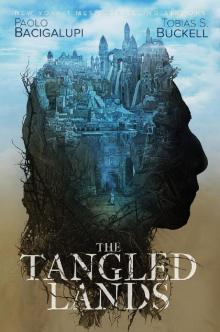 The Tangled Lands
The Tangled Lands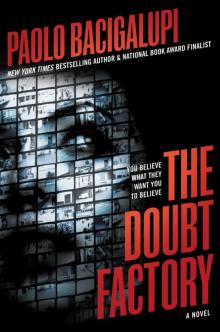 The Doubt Factory
The Doubt Factory Windup Stories
Windup Stories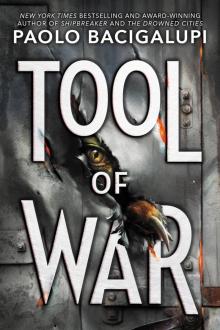 Tool of War
Tool of War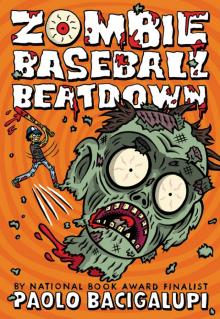 Zombie Baseball Beatdown
Zombie Baseball Beatdown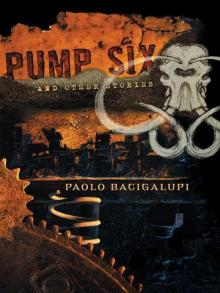 Pump Six and Other Stories
Pump Six and Other Stories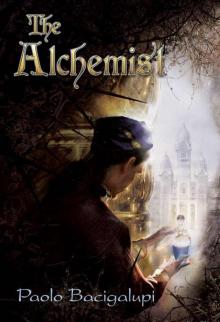 The Alchemist
The Alchemist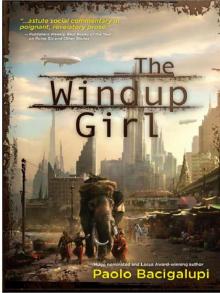 The Windup Girl
The Windup Girl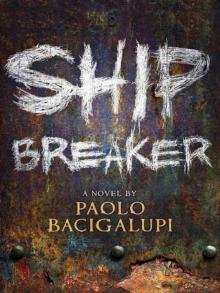 Ship Breaker
Ship Breaker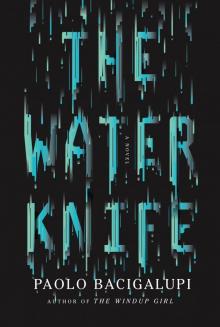 The Water Knife
The Water Knife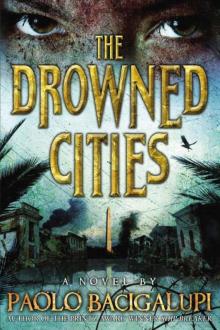 The Drowned Cities sb-2
The Drowned Cities sb-2